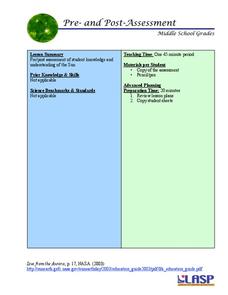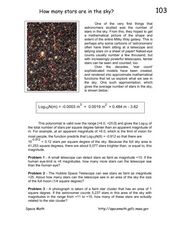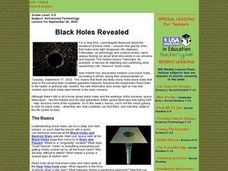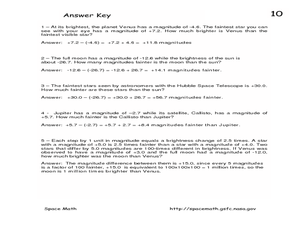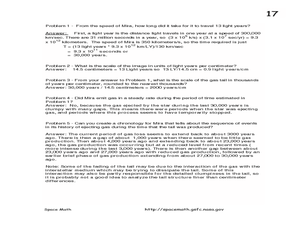Curated OER
Lesson 4 Activity 1: Mapping the Third Dimension
Students work in pairs to construct a simple stereoscope.
Curated OER
Location
Students explore the tools used by Columbus to chart his latitude. They study the change of a location over time.
Curated OER
Far-out Astronomy in a Suitcase
Ninth graders engage in a web-based research activity. They use a teacher provided worksheet to guide their research through the website. This activity provide a excellent opportunity to showcase Canadians astronomy and space science...
Curated OER
Classify By Topic
Students explore and evaluate poetry. In small groups, they read and summarize poems, complete a handout, create and perform a dramatization of a poem, and write a journal entry in response to their performance.
Curated OER
What is the Rock Cycle and Its Processes?
Geology beginners examine three different rock samples and determine their origin by their characteristics. By making and recording observations, they become familiar with features of igneous, metamorphic, and sedimentary rock types....
Curated OER
Working With Scientific Notation
In this scientific notation activity, students read about the discovery of new planets. They use scientific notation to identify the number of miles from one planet to the next. Students determine how long it would take to travel, when...
Curated OER
Vocab-u-lous! Build a Fabulous Vocab: Words Beginning with SL
In this vocabulary worksheet, students select the best word to complete the sentence. They are challenged by the difficult words that contain a sl-blend.
Curated OER
Our Amazing, Powerful Sun
Learners examine where energy comes from and how it can be used. In this solar energy lesson students explore different aspects of the sun.
Curated OER
Solar System Vocabulary 2
In this solar system instructional activity, students write vocabulary words describing the solar system next to their definitions. Students write 12 vocabulary words.
Curated OER
5th Grade Science
In this science worksheet, 5th graders complete multiple choice questions about flight, astronomers, measurement, temperature, and more. Students complete 25 questions.
Curated OER
Solar System Review
After a unit on the solar system, this resource would be a motivating way for students to review what they have learned. The presentation does not have in-depth questions, but could be used as a quick review of basic concepts relating to...
Curated OER
What Wavelength Was That?
A combination of informative text, photos, and graphics comprise this sharp show on electromagnetic radiation. Some slides mention hands-on activities for demonstrating concepts, so if you want to include them you will need to figure out...
Curated OER
The Global Precipitation Measurement Mission (GPM) Lesson
Introduce your class to one of the ways that technology is benefiting humanity. The Global Precipitation Measurement Mission involves the data collected by nine satellites from different countries with a united focus on studying world...
Mr. E. Science
Our Solar System
The presentation starts with the scientists who made discoveries about our solar system: Ptolemy, Copernicus, Galileo, Brahe, Kepler, and Newton. It also covers the planets, inner, outer, and Pluto, satellites, and an in-depth discussion...
PHET
The Sun: Pre- and Post-Assessment
Want to see how far pupils have come since the beginning of the unit? This activity is designed to be a pre- and post-assessment for a unit on the Sun. The first in a series of 18 that can be combined to form a complete unit. Two...
University of Colorado
Phases of Charon
Charon, the largest of Pluto's moons, was discovered in 1978. Lesson is a walk through of how to solve for the phases of Charon. It uses two different points on Pluto and takes into account the tilt of the pole, the rotational axis, and...
Curated OER
How Many Stars are in the Sky?
In this star count worksheet, students solve three problems using a given polynomial and its logarithm to determine the number of stars in a given area.
Curated OER
How Many Stars in the Milky Way?
Students perform an experiment in which they will use a statistical method called `sampling' to count to a billion (and beyond). Students practice sampling by estimating the number of characters on a page from the classified section of a...
Curated OER
Compare and Order Whole Numbers
In this compare and order whole numbers worksheet, students sharpen their problem solving skills as they solve 6 story problems.
Curated OER
Black Holes Revealed
Students explore the concept of black holes through an interactive program. They explore how they form and what materials form them. They can also visit websites in which they can research radio transmission between the Earth and space.
Curated OER
Light and Optics
Third graders utilize the scientific method to explain light and optics in this five lessons unit. Through experimentation and discussion, 3rd graders canvass the concepts of light traveling, reflection and refraction.
Curated OER
How Do We Explore Strange Environments?
Students identify and label the different parts of a robot, rover, or a spacecraft. They discuss and record all of the features their robot will need to accomplish its mission and be able to explain why they chose these features to...
Curated OER
The Stellar Magnitude Scale
In this stellar magnitude scale activity, students use a scale showing the magnitude of objects in the sky to answer 5 questions about the brightness of the moon, the planets and stars.
Curated OER
A Star Sheds a Comet Tail!
In this comet tails and stars worksheet, students read about the star Mira and the vast clouds of gases it emits. They use a photograph from the Galaxy Evolution Explorer satellite to solve 5 problems about the scale of the image, the...
Other popular searches
- Space Telescopes
- Hubble Telescopes
- Compare Telescopes
- Optical Telescopes
- Reflecting Telescopes
- Making Telescopes
- Space Tools Telescopes
- Telescopes Distant Objects
- Telescopes Handout
- Optical and Radio Telescopes
- Convex Lenses and Telescopes
- Radio Telescopes
















